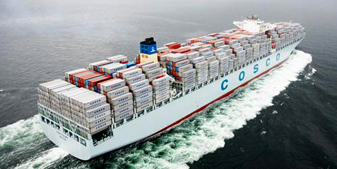|
Some shippers want faster services but they would probably be better served demanding better reliability first, according to the latest issue of Container Insight by Drewry Maritime Research.
At last week’s global shipping conference in Hamburg, Robert Gora of Siemens said ocean carriers should offer faster services between Asia and Europe, saying that many companies are willing to pay a premium for expedited options.
Gora said it currently takes around 40 days door-to-door to ship from Shanghai to Germany, compared to 10 days for the much more expensive airfreight option and 20 to 25 days for rail. Assuming no interim ports and ships sailing at 24 knots, Drewry calculates that the fastest possible transit time between Shanghai and Hamburg is 19 days, a potential saving of 10 days against the current best.
Slow steaming has become entrenched within the container industry and shippers have long since adapted to its demands, Drewry says, meaning the market for faster services would be relatively small, limited to shippers experiencing extraordinary demand peaks and/or having to plug occasional gaps caused by poor service reliability.
The onus is therefore on the shippers to prove the economic case to carriers for faster services. The big ship economies dominating the Asia-to-Europe trade mean that the smaller the ships deployed on
|

any new fast loop the bigger the premium would have to be. Diverting cargo from the existing slower and big ships would also make it harder to fill them, adding huge downward pressure on already non-compensatory freight rates.
In Drewry’s opinion, shipping lines would need a long list of cast-iron guarantees in terms of minimum volumes, rates and floating BAF that would probably be unworkable for most shippers.
Better reliability is a win-win for shippers and carriers. Carriers shouldn’t need extra incentives to meet their schedule promises as delays hurt them too, from missing berthing windows, feeder connections, customer resolutions, and generally from ships being less productive than they could be. Convincing them there is a market for fast services will be much harder.
Drewry concludes that container lines are too far down the slow streaming road to change course now, and would need intense persuasion to even consider introducing faster options. Shippers would have more success pressing for more reliable services.
|




